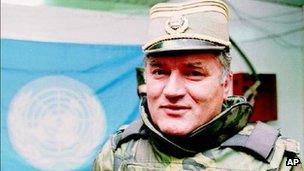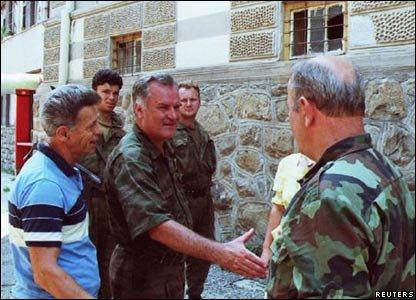The day I met Mladic
- Published

Ratko Mladic said he dreamed of world peace
As the war crimes trial of General Ratko Mladic begins at The Hague, the BBC's Allan Little recalls meeting him for the first time.
It was June 1992 and you could stand at a Serb gun position on Trebevic Mountain on the south side of Sarajevo and gaze down at the city beneath you, shimmering in the haze of high summer. The streets were laid out like a map at your feet. You could see how easy it was for the gunmen to pick a target.
"Can you hit the Holiday Inn from here?" I asked one machine gunner. (The hotel would later house the foreign press corps; the BBC would set up its office there later that summer. It looked dangerously exposed to me). "Ha!" he laughed. "Hit the Holiday Inn? Choose a window!"
There was an old Yugoslav Army barracks nearby at a place called Lukavica. I called there trying to find a way into the besieged city - seeking Serb military permission to cross the siege lines.
Serb paramilitaries wandered around, draped in bullet belts and bandanas, young men pumped up with the prospect of battle, intimidating in their confident, aggressive swagger.
There were weapons for sale. One man told me you could buy a hand grenade for a dollar - the same price, I would learn later, that you would pay for a fresh egg in the besieged, hungry city.
War in secret
It was here, that day, that I met General Mladic in person, one to one, for the first time. I shook his hand. He held it firm and would not let go for what seemed to me to be many minutes. He drew unnervingly close, just a few inches from my face.
"I dream of a world of peace," he said, "in which the only guns will be made of plastic, for little boys to play with and re-enact the struggles of their ancestors".
As he spoke, men serving in an army under his command were bombarding the city beneath us.
And that, in some ways, was the least of it. Across northern and eastern Bosnia, where Bosniaks (Bosnian Muslims) and Serbs had lived side-by-side and intermingled for centuries, a different kind of war was taking place.
In each municipality, Serb nationalists had set up a so-called "Emergency Committee". In each place, this committee set about the removal of non-Serbs from their homes.
In most places, there was no fighting. Gen Mladic's men simply rounded up the non-Serb population, separated the men from the women and children, expelled the latter and imprisoned the former.
Many of those men deemed to be a threat were summarily murdered. Many of the women were held as sex slaves. The TV cameras saw little or none of this. Word leaked out slowly to an incredulous world.
One evening, months into the war, the Bosnian Serbs' deputy president, a suave Shakespeare scholar called Nikola Koljevic, who would later commit suicide, told a British newspaper reporter, privately: "You know we are glad you reporters were so focused on Sarajevo in the spring and summer of 1992, because it enabled us to get on with what we had to do in the north and the east of the country."
Criminal enterprise
The term "ethnic cleansing" was not coined by the foreign media to discredit the Serbs. It is the term they themselves used to described what they were doing.

Ratko Mladic, greeting a Bosnian Serb soldier, in Srebrenica
Srebrenica is the atrocity the world knows about. But Srebrenica did not come out of the blue. The rounding up of civilians, and the targeted killings, and the forced expulsions, and the rapes and the massacres had been going on for three years before Srebrenica.
There remains, even now, a dispute about the nature of the war. There are many who still insist on a kind of moral equivalence; who still insist that, in essence, all sides were equally guilty.
For there were, after all, atrocities on all sides.
But there was something distinctive about the Serb war effort. At its heart there was a criminal enterprise - the deliberate forced removal of civilian populations aimed at creating an ethnically pure territory.
It was organised town-by-town and village-by-village. It was centrally directed, carefully planned, well resourced, backed up by overwhelming military force and, crucially, it was state-sponsored.
What role was played by the man who shook and held onto my hand that hot summer's day 20 years ago? That is now for the courts to determine.